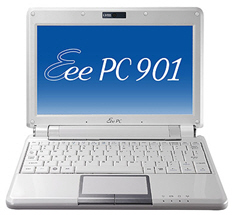 Netbooks were undoubtedly one of the hit products of 08, seemingly bucking the trend as the economy took a turn for the worse and with it a fall in PC sales. However, moving into 09, Netbook sales aren’t fairing quite as well, dropping 26% according to figures published by market watcher DisplaySearch (via The Register). And while that’s broadly inline with the overall PC market, it could suggest that the current generation of Netbooks may be running out of steam.
Netbooks were undoubtedly one of the hit products of 08, seemingly bucking the trend as the economy took a turn for the worse and with it a fall in PC sales. However, moving into 09, Netbook sales aren’t fairing quite as well, dropping 26% according to figures published by market watcher DisplaySearch (via The Register). And while that’s broadly inline with the overall PC market, it could suggest that the current generation of Netbooks may be running out of steam.
According to the researcher, 5.9m netbooks were shipped worldwide in Q1, down 26 per cent from the 8m shipped in Q4 2008. In Q1, netbooks accounted for around a fifth of the total sales of portable PCs, some 30.3m units in all, including regular laptops.
Notebooks shipments were down 25 per cent sequentially.
Acer performed best, shipping 1.8m machines. While Asus, who pioneered the whole Netbook product category, took second place, shipping 900,000 devices. This was followed by HP on 700,000, Dell on 400,000, and Toshiba and Lenovo selling 200,000 units each. The rest of the market – Samsung, MSI and Fujitsu – managed to shift just 900,000 Netbooks.
Of course, comparing Q4 (the holiday season) with Q1 isn’t nearly like for like, the figures do point to the Netbook losing its crown. And if that is indeed the case, I’m not entirely surprised.
Following the success of the original Eee PC, the market was subsequently saturated with “me-too” devices based on the same Intel Atom chipset set with little to distinguish one Netbook from another. Having had many friends and relatives seek my advice on which Netbook to purchase – and being a big Netbook fan myself – I’ve kept a close eye on the market, largely basing any recommendation on finite details, such as battery life and even how the keys are arranged on the QWERTY keyboard. In otherwords, after the initial gold rush, show me the innovation?
For example, Netbooks capable of playing back High Definition video were meant to be next on the roadmap, although Intel is reportedly scaling back on its HD-capable Atom offering, based on a lack of take up from PC manufacturers. Perhaps, for fear that this would push the cost up too much, or for technical issues, such as the hit in battery life that hardware HD decoding would impose.
